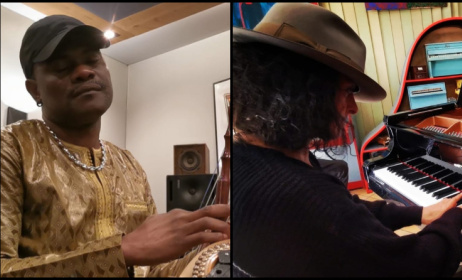Running an Indie music label (pt. 1)
by Phathu Ratshilumela
Let's be honest, running an independent recording company is not an easy thing. Setting up the business, having a clear understanding of the target market, devising a marketing strategy, finding and signing the right artists, recording the projects, releasing and distributing them and finding the right accountant and publisher to work with is definitely no easy task. It is important that before you look at establishing your label, you start by understanding exactly how the music industry operates and begin networking with those who can be of assistance.
 Openroom Studios in Johannesburg
Openroom Studios in Johannesburg
This two-part article serves as an overview of what it takes to set up an independent label. Over the past years there have been many independent labels in South Africa, some having climbed the ladder to the top of their game, others who've found it to be more difficult than it seems. The truth of the matter is that the local music industry is still developing as compared to that of other countries such as the US and European countries. It has been and still is very difficult for local labels to present their music to the worldwide market. But even so, that does not mean that one cannot run a successful label here at home. There are many examples of success such as TS Records, Bonzo Music, Impakt Sounds and SoulCandi who all started from scratch but today are some of the most successful independent labels in South Africa. More exciting is that all these labels are still operating within the local territory.
These are just some of the things you need to take into consideration should you wish to run a music label.
Registering your company
These days if you don't fully understand how to set up a company, there are people you can consult, who charge a reasonable amount of money to register your company, register for VAT and PAYE and open a bank account. Alternatively, you can do all this by yourself if you know exactly what to do. The important thing is to understand that you are setting up a business that earns money, pays staff (even if you are the only salary earner) and suppliers, charges clients and pays tax accordingly.
Getting your paper work sorted
If you are planning on running your label as a successful business then you need to get your paper work in order. Please insure that your tax and all your income that you will be making through the label are accounted for. This means that you may need to do the paper work yourself but I advise you not to be a jack of all trades especially if you know little about accounting. So the best would be to employ an accountant on a part time basis to help you with your books. You will definitely want to do your own invoicing and be able to provide clients with statements, but you don't want to be stuck mulling over your books entirely yourself.
Also, be aware that you need to learn about the legalities of music copyright and intellectual property. You will also need to decide whether you think you can handle your own publishing under your company or if you would prefer to alternatively sign a non-exclusive deal with a label or publisher. What is more important is that before you do anything with anyone you need to have your contracts prepared. Usually the people who will be happy to assist you in drafting contacts are music lawyers and you'll probably want to consult with one of them when it comes to actually signing your first artist.
Identifying the genre you want to pursue
You need to find time to really identify the genre of music you want to pursue. Think back to the ultimate reason why you wanted to establish an independent label in the first place. Think of what music you are passionate about, the music you understand, the music you believe you can focus on. If you have a love for music and also a clear understanding of where you want to head, then music genre would be probably one of the first things you would have decided on.
But if you are new in the game and not so sure where to go, I advice you to take some good time familiarizing yourself with the industry and the various genres of music. Getting to know the industry will help you channel your label in the right direction. Through personal experience, what I have come to realize is that people focus on genres of music they love. If you want to start a record label for simply business reasons, and you are not in love with the type of music you want to release, chances are your label will fail because wont truly understand your target market.
But you also have to stop listening to music as a hobby once you set up a recording label. To reiterate you need to understand that you are running a business and it needs to be treated so because at the end of the day, it has to appeal to the target consumer so it can pay the bills.
Signing of the artist
Before you even open your door for demos, know that most of the best artists are hustlers. So, you are likely to hear the artist somewhere or see them performing. With that, already the artist knows the kind of music they want to pursue; all they need is someone who can help them actually make an album and assist them in building a career. Also if you see an artist performing and they really captivate and entertain a crowd then you know that not only will they appeal to a target market, but they also know how to perform which is very important when it comes to promoting an album.
In most cases, the artist might already be working with a few people, like a producer and some musicians and so on. If you like the sound of the artist's music then you probably want to also work closely with the people the artist is working with. On this note, it's important to start developing relationships with certain producers and session musicians so that you can bring them in on a project if the artist doesn't have anyone already in mind.
You just need to do your homework. If you know the genre of music you want to focus on then you need to know where the fans of that genre go to hear the music. Once you know where that is you can frequent those venues and you should soon identify which artists performing at those venues are talented enough to be recorded and produced.
The chances are, however, that you're already a part of the scene and may already know which artist/s you want to work with.
The next part of this series focuses on recording and producing a project, the artistic design of a project, marketing and promotional strategy, distribution and the organizations that you need to develop a relationship with. Stay tuned for part 2.






























Commentaires
s'identifier or register to post comments